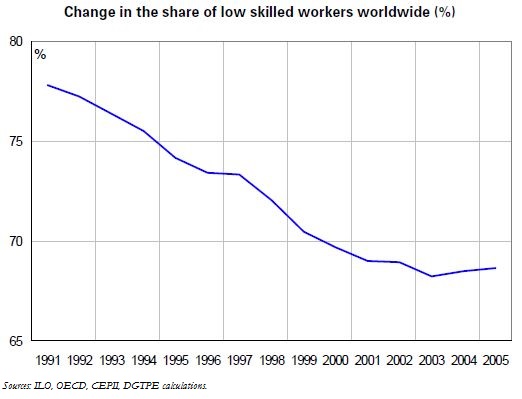Trésor-Economics No. 49 - The effects of globalisation on the supply of factors of production
The emergence of new economic giants like India and China combined with very rapid growth in trade have profoundly altered the supply of factors of production on a global level. The supply of labour weighted by the share of exports in global GDP has more than doubled since 1980, as has the stock of capital.
Despite efforts to raise educational standards, low skilled workers continue to dominate global labour supply, even if their share of the world's total working population fell by 8 percentage points in the 1990s to 69%, where it has remained since 2000. This trend stems mainly from the opening up of emerging countries. In advanced countries, on the other hand, the share of highly skilled labour rose from one quarter to nearly one third between 1991 and 2005, while that of the low skilled fell sharply.
Where wages are concerned, in theory trade opening is accompanied by a relative fall in the wages of unskilled workers in developed countries, especially given that the skill structure of the working population in the developed countries differs from that of emerging countries.
The higher proportion of skilled workers in advanced countries goes hand in hand with a larger stock of capital relative to the labour factor. Trade opening therefore leads to a rise in the relative remuneration of skilled labour and capital. In addition, the capital intensity of exported merchandise grows faster in advanced countries than in the world as a whole, thereby leading to greater specialisation and widening pay differentials.
The expansion of trade between emerging and developed countries is thus accompanied by increasing differences in the use of factors of production and greater specialisation, which is increasingly beneficial to the various parties.
